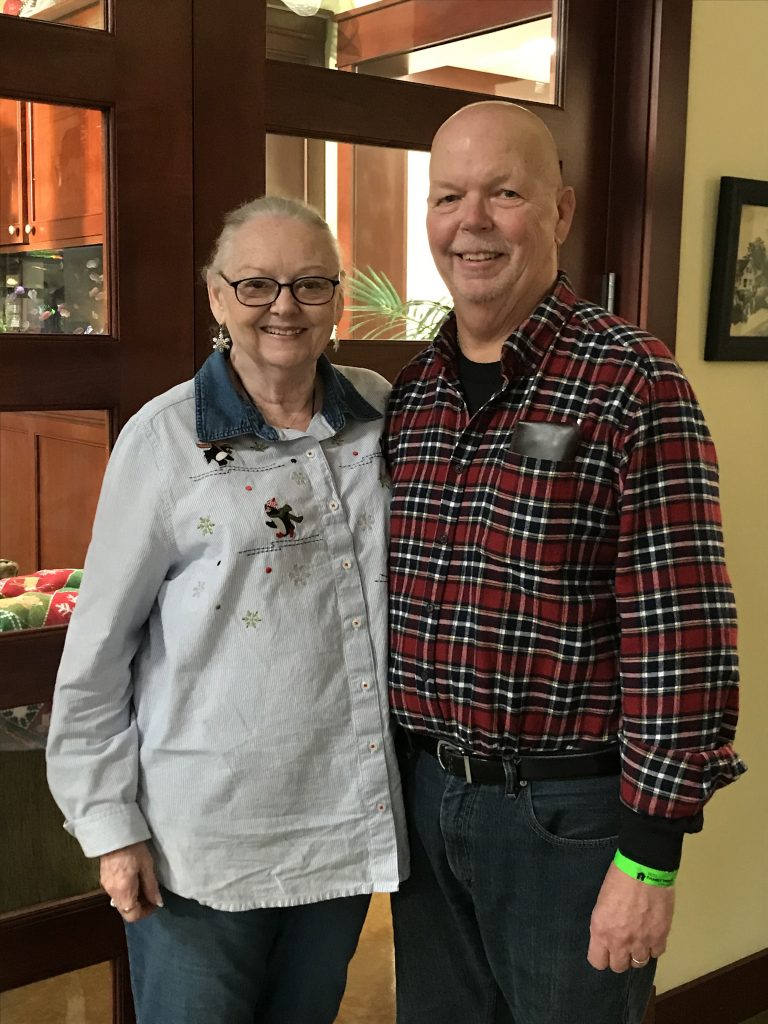After undergoing chimeric antigen receptor T-cell (CAR-T) therapy as part of a clinical trial to fight his lymphoma, Jeff Nicol was ready to do something he loved again – play golf. But there was one caveat: no handshakes. With a compromised immune system, even something as simple as congratulating a friend on a nice round of golf or eating out at a restaurant was an obstacle for 72-year-old Nicol and his wife, Pat.

“We had to be really cautious about where we ate,” Pat Nicol said. “No buffets, no salad bar. Buffets are easy to transfer germs. The hardest part was to not shake hands; fist bumps, not high fives.”
Nicol had to make adjustments to his life during treatments, but after four years of dealing with large B-cell lymphoma, he embraced the changes and was ready to do whatever it took to be healthy again.
Jeff’s cancer journey
Nicol’s cancer journey started in 2015, in his hometown of Wilmington, North Carolina, when he found a lump in his groin. He saw a local oncologist and went through six rounds of chemotherapy, culminating in a clean PET scan. But additional scans told another story.
“I got to a year, and they found a hot lymph node,” Jeff Nicol said. “They found large B-cell lymphoma was back again.”
Nicol underwent more chemo in 2017, and came to the North Carolina Cancer Hospital, the clinical arm of UNC Lineberger for a stem cell transplant in 2018. A Wilmington resident, Nicol had no prior experience with the UNC Health Care system but was pleasantly surprised by the time he spent in Chapel Hill.
“If it wasn’t for the stem cell transplant and cancer, it would have been a pleasant visit,” Nicol said. “Everyone was great. I can’t say enough good things about the people and the personalities at UNC.”
Following the transplant, Nicol had a rough go, landing in the intensive care unit with a high fever and low blood pressure. After bouncing back, the Nicols headed back to Wilmington, where Jeff continued to see an oncologist for follow-up care. A scan showed some concerning spots in his neck, and after a biopsy, found that while there was no evidence of large B-cell lymphoma, he now had follicular B-cell lymphoma.
CAR-T clinical trial
Under the guidance of UNC Lineberger’s Marcie Riches, MD, Nicol enrolled in a CAR-T clinical trial to tackle the new cancer. Riches said she thought the clinical trial would be a good fit for Nicol due to his physical fitness, and because CAR-T approaches have proven effective in patients who relapse after transplant or those who are ineligible for transplant due to minimally responsive or non-responsive lymphoma.
“Mr. Nicol was an excellent candidate for a clinical trial of CAR-T,” Riches said. “His lymphoma had recurred about 18 months after his high dose chemotherapy and autologous transplant. Lymphoma recurrence after transplant is considered incurable, however, the efficacy of CAR-T is promising for long term disease control, but it has known toxicities that in some cases are quite severe. I discussed with Mr. Nicol all options including commercial CAR-T products, conventional chemotherapy, and our clinical trial with our CAR-T that targets CD19, the same target as the commercial products.”
Safety switch feature
Riches knew that UNC Lineberger’s clinical trial was a little different than typical CAR-T options due to the safety switch component. This can switch off the modified T-cells if patients show signs of toxicities.
“This safety switch, if activated, can “turn off” the CAR-T cells but allows them to persist in the blood and potentially still control lymphoma,” Riches said. “This is different from the commercial products in which steroids are required in these severe cases; the steroids result in destruction of the CAR-T cells.”
Nicol’s T-cells were harvested, sent to UNC Lineberger’s Advanced Cellular Therapeutics (ACT) Facility and modified to attack to his lymphoma. His T-cells were re-infused, and he spent a week in the hospital. The difference in treatment for Nicol was in the way he felt following the therapy – no serious side effects.
“It’s better,” he said of the therapy. “I’m getting stronger.”
Pat Nicol agreed. “This was so much better than the stem cell transplant,” she said of his recovery.
Moving forward
Throughout all his treatments, Nicol credits Pat and his family and friends for supporting him, and the faculty and staff at the N.C. Cancer Hospital for treating him right.
He and Pat are celebrating two milestones this year – successful cancer treatment for Jeff and their 50th wedding anniversary. The whole family is heading to the Caribbean for a cruise, something they also did to cheer the first time Jeff showed no sign of disease.
“Family support is paramount,” Jeff Nicol said. “We had terrific support from friends and family. This lady right here, I wouldn’t have gotten through it without Pat.”
“It works both ways,” she said. “He’s been there for me. We’re a team.”
Jeff Nicol said staying active during his recovery has been easier with his friends and family by his side, and getting back on the links has allowed him to recover faster.
“I really think activity is helpful for recovery,” he said. “I started playing golf right away. It was difficult, and [his golf buddies] did have to help me a time or two.”
But he also wants his friends and family to know that he’s doing OK. He tries to be as honest with them as possible.
“At times it’s very difficult, but you have to maintain a sense of humor,” he said. “If you don’t, it will really drag you down.”
Learn more about the CAR-T Immunotherapy Program at UNC Lineberger
